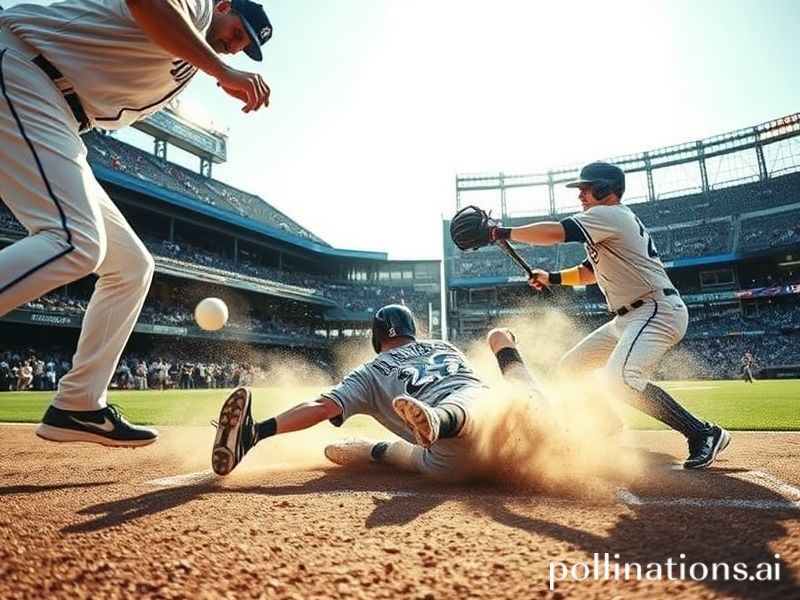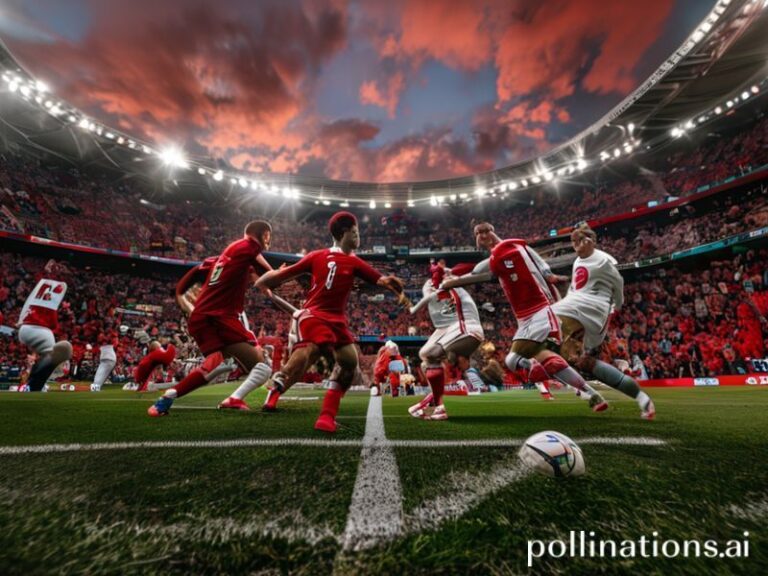Rays vs Blue Jays: Baseball’s Quiet Proxy War for the Soul of Late Capitalism
Rays vs Blue Jays: The Balkanization of Baseball and Other Tragedies in Miniature
By “Roving” Rodrigo Amarante, foreign correspondent stuck in a Tampa strip-mall Starbucks
Tampa, Florida—The Tropicana Field roof is doing its best impression of a half-deflated bouncy castle, sagging under subtropical humidity and the accumulated sighs of 14,000 ticket holders who suspect they’ve been conned. Meanwhile, 1,900 kilometers north, the retractable ceiling of the Rogers Centre glides open like a Bond villain’s lair, revealing a sky the color of weak tea and a nation that still pretends summer exists. Tonight, the Tampa Bay Rays and the Toronto Blue Jays will play a game whose box score will be forgotten by Thursday but whose subtext will ricochet across hemispheres like a rogue drone.
Let’s zoom out, because context is the only antidote to existential dread. On paper this is a mid-May AL East tilt, standings still embryonic, pitching probables still optimistic. In practice it is a proxy war for two competing models of how to remain relevant in a century that has already relegated baseball to cultural side salad. The Rays—perennial paupers in MLB’s caste system—operate like a fintech startup: all arbitrage and asset swaps, trading veterans for lottery tickets while their payroll hovers just above the median household income of Liechtenstein. The Blue Jays, owned by a telecom oligopoly that also controls half of Canada’s maple-syrup pipeline, spend like a Scandinavian welfare state and still finish third.
From the vantage point of an overworked Cairo Uber driver streaming the game on a cracked phone, the contest looks less like sport than a seminar in late-capitalist resource allocation. He recognizes the Rays’ austerity playbook; his government used the same IMF manual. He recognizes the Jays’ splashy imports; they remind him of Gulf-state football clubs buying glory in 90-day installments. Somewhere in Seoul, a crypto day-trader toggles between the live feed and a collapsing stablecoin, wondering which bubble will pop first. The answer, of course, is both.
Global supply-chain note: the baseball itself is stitched in a Costa Rican factory where workers earn $1.60 an hour, roughly the price of a domestic beer inside Tropicana Field—assuming you can find one that isn’t labeled “light.” The bat gripping the pine tar? Northern white ash harvested under Canadian logging quotas that conveniently overlook First Nations land claims. Even the oppressive stadium Wi-Fi is routed through servers in Dublin, because nothing says “America’s pastime” like Irish tax shelters.
Back on the field, the geopolitics grow deliciously petty. Vlad Guerrero Jr.—a Dominican-Canadian demigoose—steps in against Shane McClanahan, a Floridian lefty whose slider breaks harder than EU sanctions on Belarus. The at-bat lasts nine pitches, each one chewed over by announcers as though divining sheep entrails. When Vlad finally lines a single, the crowd in Toronto emits a polite roar, the kind Canadians reserve for discovering free parking. In Havana, an illegal stream buffers eternally at 144p; the pixels rearrange themselves into the ghost of Fidel wondering why no one bunts anymore.
Consider the fans. Tampa’s stands are 30 percent Quebec snowbirds who flew Allegiant for $39 and consider this their cultural duty, like visiting a museum of American decline. Toronto’s stands are 20 percent Buffalo expats who drove five hours because the Jays still refuse to schedule weekday matinees for people with actual jobs. Both groups are united by the quiet certainty that tomorrow will be worse, but tonight they have nine innings of controlled narrative before the real world barges back in with gas prices and drone strikes.
By the seventh-inning stretch, the score is tied 3-3, a stalemate so symmetrical it could be a UN ceasefire. A Japanese submarine pitch-clock sponsor flashes across the ribbon board; an Emirati airline shills discounted flights to Sarajevo. The jumbotron blares a military flyover that was filmed last week because the real jets are busy somewhere over the Strait of Hormuz. Everyone stands for “God Bless America,” then sits back down to check how their fantasy crypto portfolio is hemorrhaging.
The game ends on a Wander Franco walk-off—ironic, because Franco’s $182 million extension is exactly the sort of financial commitment the Rays’ front office normally treats like a phishing scam. Fireworks explode in primary colors that briefly outshine the adjacent strip-mall vape shop. In the press box, a British correspondent files copy calling it “quintessential Americana,” blissfully unaware that the term now encompasses school shootings and insulin rationing.
Conclusion? There isn’t one, only a slow dissolve into the humid night. The Rays will flip Franco for prospects by 2026; the Jays will sign another Boras client and miss the playoffs on the last day. Meanwhile, somewhere in Lagos, a kid watching on bootleg IPTV decides the whole spectacle is less interesting than the Champions League highlights that follow. And that, dear reader, is how empires end—not with a bang, but with a lazy fly ball to left-center that dies in the warning track’s synthetic grass, unmourned, unmemorialized, already uploading itself to oblivion.







